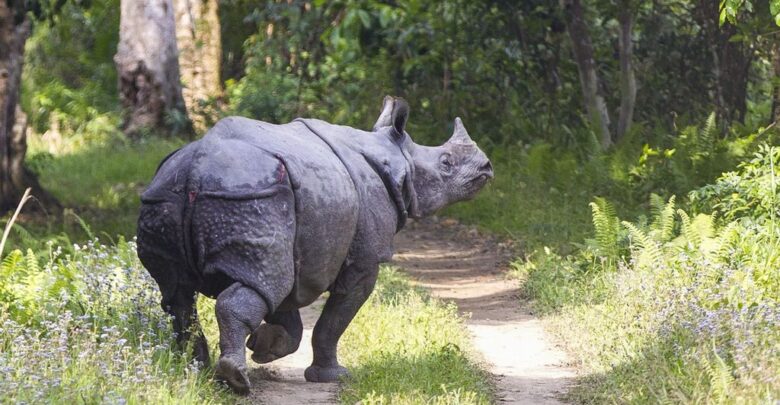

GUWAHATI, India — As many as 2,500 horns, mostly of the Indian rhinoceros seized from poachers and smuggling syndicates, elephant tusks, and parts of dead animals stockpiled over the last four decades, are being verified by forest officials in India’s northeastern state of Assam.
The Assam government in 2016 had appointed a Rhino Horn Verification Committee following allegations that original rhino horns in the district treasuries were being replaced by fake horns.
Around 2,500 horns were found to be genuine. The same committee also found what was considered the world’s largest horn 14 inches in length and weighing over 6.6 pounds.
Of the 261 horns verified so far, 241 have been marked for destruction and 18 for preservation.
Amit Sahai, Principal Chief Conservator of Forest (Wildlife), said that the verification of rhino horns stored in Kamrup, Barpeta, and Morigaon districts had been completed while it is underway in Sonitpur, Nagaon, Golaghat, and other treasuries.
Sahai said various stakeholders, including media persons and non-governmental organizations (NGOs), are involved in the ongoing verification of rhino horns, elephant tusks (ivory), and body parts of other protected animals stored in the district treasuries to ensure transparency in the whole exercise. The entire operation is being screened live.
The exercise is being conducted by seven zonal committees and a technical panel constituted by the Chief Wildlife Warden. Six zonal committees from Aug. 18 to Aug. 23 made comprehensive records of each specimen. These included forensic examination, DNA extraction, photographic record, and barcoding for identification of the body parts.
The destruction of the horns and other animal articles will be carried out in conformity with a relevant section of the Wildlife (Protection) Act of 1972.
“The Environment and Forest department is mulling to dispose of the damaged rhino horns on the National Elephant Appreciation Day on Sept. 22,” said Sahai.
“Barring the rhino horns linked to court cases and some good samples of horns for showcasing in museums and for scientific and academic purposes, the rest of the horns will be destroyed,” he said. Sahai clarified that rhino horns are not meant for display or for use in any other way by any individual.
The forest department will take a final decision on destroying the horns after a public hearing on Aug. 29 and based on recommendations of a state-level committee constituted last month for the purpose, according to M.K. Yadava, Chief Wildlife Warden.
Assam’s Kaziranga National Park is home to India’s largest population of rhinos on the Indian subcontinent, with 70 percent rhinos alone to itself. The state of Assam is estimated to have 85 percent or around 2,650 rhinos. The greater one-horned rhino is listed as ‘vulnerable‘ on the International Union for Conservation of Nature’s (IUCN) Red List.
Habit destruction and poaching are among the biggest conservation threats for the sub-species.
(With inputs from ANI)
Edited by Amrita Das and Krishna Kakani
The post Indian Officials Worry About 2,500 Rhino Horns And Elephant Tusks Seized Since 1980s appeared first on Zenger News.



